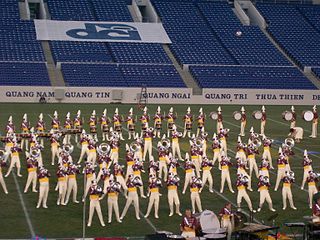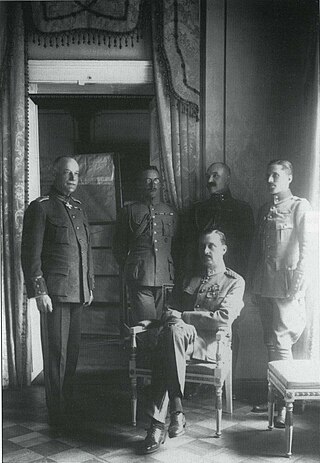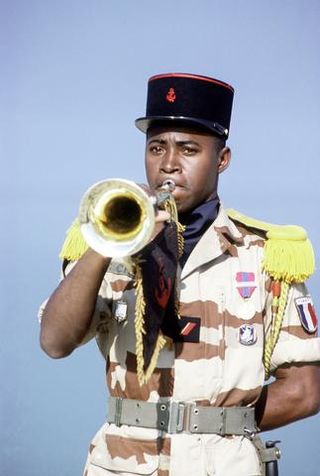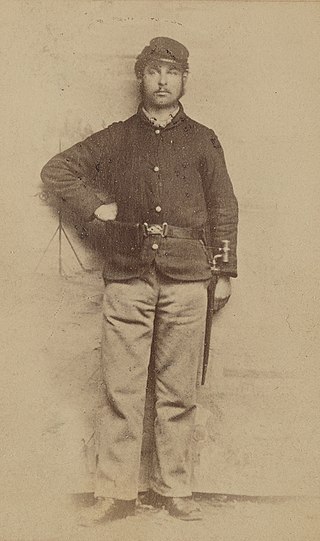
The bugle is a simple signaling brass instrument with a wide conical bore. It normally has no valves or other pitch-altering devices, and is thus limited to its natural harmonic notes, and pitch is controlled entirely by varying the embouchure.
The Daily Bugle is a fictional New York City tabloid newspaper appearing as a plot element in American comic books published by Marvel Comics. The Daily Bugle is a regular fixture in the Marvel Universe, most prominently in Spider-Man comic titles and their derivative media. The newspaper first appeared in the Human Torch story in Marvel Mystery Comics #18. It returned in Fantastic Four #2. Its offices first shown in The Amazing Spider-Man #1.

A modern drum and bugle corps is a musical marching unit consisting of brass instruments, percussion instruments, electronic instruments, and color guard. Typically operating as independent non-profit organizations, corps perform in competitions, parades, festivals, and other civic functions. Participants of all ages are represented within the corps activity, but the majority are between the ages of 13 and 22 and are members of corps within Drum Corps International or Drum Corps Associates.

"Taps" is a bugle call sounded to signal "lights out" at the end of a military day, and during patriotic memorial ceremonies and military funerals conducted by the United States Armed Forces. The official military version is played by a single bugle or trumpet, although other versions of the tune may be played in other contexts. It is also performed often at Girl Guide, Girl Scout, and Boy Scout meetings and camps. The tune is also sometimes known as "Butterfield's Lullaby", or by the first line of the lyric, "Day Is Done". The duration may vary to some extent.

A military band is a group of personnel that performs musical duties for military functions, usually for the armed forces. A typical military band consists mostly of wind and percussion instruments. The conductor of a band commonly bears the title of Bandmaster or Music director. Ottoman military bands are thought to be the oldest variety of military marching bands in the world, dating from the 13th century.

General Sir William Dillon Otter was a professional Canadian soldier who became the first Canadian-born Chief of the General Staff, the head of the Canadian Militia.

Adjutant is a military appointment given to an officer who assists the commanding officer with unit administration, mostly the management of human resources in an army unit. The term adjudant is used in French-speaking armed forces as a non-commissioned officer rank similar to a staff sergeant or warrant officer but is not equivalent to the role or appointment of an adjutant.

An adjutant general is a military chief administrative officer.

Phantom Regiment Drum and Bugle Corps is a World Class competitive junior drum and bugle corps based in Rockford, Illinois, USA. The corps is a long-standing member of Drum Corps International (DCI), having been a DCI World Championship Top Twelve Finalist every year since 1974 and DCI World Champions in 1996 (tie) and 2008.

"Reveille", called in French "Le Réveil" is a bugle call, trumpet call, drum, fife-and-drum or pipes call most often associated with the military; it is chiefly used to wake military personnel at sunrise. The name comes from réveille, the French word for "wake up".

The Fightin' Texas Aggie Band is the official marching band of Texas A&M University. Composed of over 400 men and women from the school's Corps of Cadets, it is the largest military marching band in the world. The band's complex straight-line marching maneuvers are performed exclusively to traditional marches.

A bugle call is a short tune, originating as a military signal announcing scheduled and certain non-scheduled events on a military installation, battlefield, or ship. Historically, bugles, drums, and other loud musical instruments were used for clear communication in the noise and confusion of a battlefield. Naval bugle calls were also used to command the crew of many warships.

An aiguillette, also spelled aguillette, aiglet or aglet, is a cord with metal tips or lace tags, or the decorative tip itself.

The Pioneer Drum & Bugle Corps was a World Class competitive junior drum and bugle corps from Milwaukee, Wisconsin. Pioneer is a former member corps of Drum Corps International (DCI).
"Assembly" is a bugle call that signals troops to assemble at a designated place.

A Corps of Drums, sometimes known as a Fife and Drum Corps, Fifes and Drums or simply Drums is an army unit used in several nations. Drummers were originally established in European armies to act as signallers. The major historical distinction between a military band and a corps of drums is that 'drummers' were not employed to play their instruments to entertain or delight, but instead to carry out a utilitarian battlefield role. This role is fulfilled by trumpeters or buglers in the cavalry and the artillery, who traditionally did not form into organised groups in the way that drummers did; therefore, a typical corps of drums would exist in the infantry arm.

Major General (Vermont) Thomas E. Drew was the adjutant general of the State of Vermont. In this post he served as the senior uniformed military officer in the state, and was responsible for the organization, training and equipping of the 4,000 members of the Vermont Army and Air National Guard. As adjutant general, he also served as inspector general, quartermaster general and head of the State Military Department, including veterans affairs.

For more than a century the Military Parade of Chile or Great Military Parade of Chile has been a tradition within the Independence Day holidays in Chile. It is held in Santiago, Chile's O'Higgins Park on September 19 yearly in honor of the Glories of the Chilean Army with a military parade involving not just the ground forces but by the rest of the Chilean Armed Forces: the Chilean Navy, the Chilean Air Force, and the Carabineros de Chile. It is also in honor of the anniversary of the formal inauguration on that day in 1810 of the First Government Junta, which witnessed the first military parade of the independent nation at the Plaza de Armas, Santiago. It is the final act of the national independence celebrations, which are broadcast through TV and the Internet and radio.
The General Staff was a Swedish government agency established in 1873 and was active until 1937. It was headed by the Chief of the General Staff which was a senior member of the Swedish Army.

Charles Wellington Reed was an American soldier who fought with the Union Army in the American Civil War. Reed received his country's highest award for bravery during combat, the Medal of Honor, for actions taken on July 2, 1863 during the Battle of Gettysburg.


















